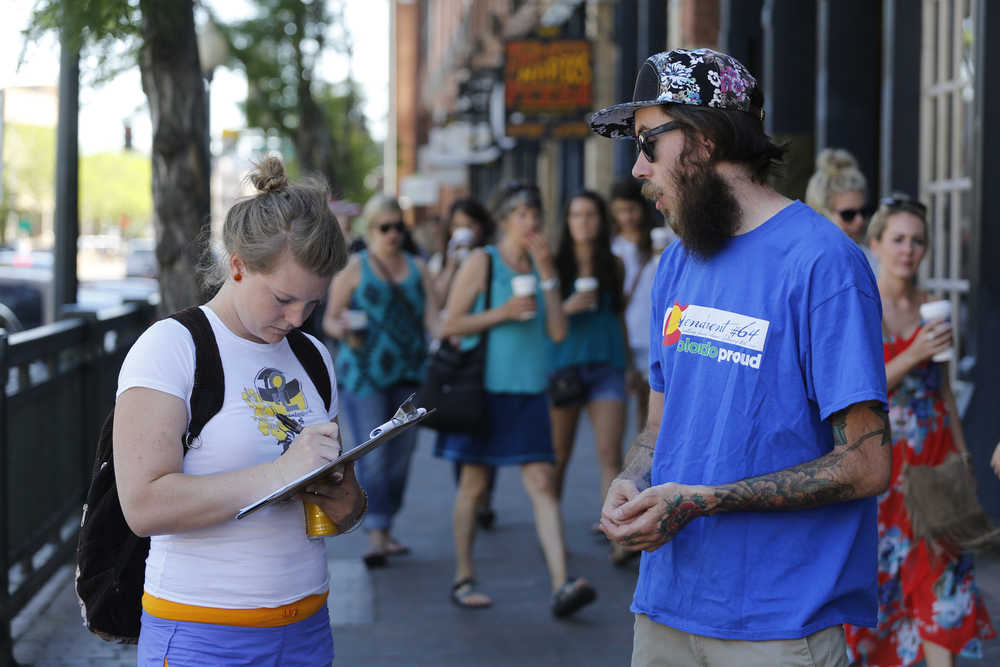DENVER — Legal marijuana is giving Colorado a stinky conundrum. Visitors can buy the drug, but they can’t use it in public. Or in a rental car. Or in most hotel rooms.
The result is something marijuana advocates and opponents feared — people toking up on sidewalks, in city parks and in alleys behind bars and restaurants — despite laws against doing so. And they’re getting dinged with public marijuana consumption tickets.
From the capital city of Denver to mountain resorts like Aspen and Breckenridge, police wrote nearly 800 citations for the new crime of public consumption in 2014, the first year recreational sales began.
Some legalization advocates believe they have a solution — pot clubs. Denver voters may consider a ballot measure this fall to make the city the most populous place in the nation to expressly allow pot clubs.
“People need a place to go,” said Teresa Wright of the Denver suburb of Lafayette. Wright was volunteering in Denver recently to gather signatures to ask voters this fall about allowing private pot clubs in the city.
“You can go out anywhere and see people using alcohol. To socialize, to relax. But not marijuana,” Wright said. “We deserve to have a place. It’s a legal activity.”
But marijuana clubs have proven a harder sell here than legalizing the drug in the first place.
The amendment that legalized marijuana doesn’t give people the right to use it “openly or publicly,” a nod to critics who said legalization would lead to an explosion of Amsterdam-style clubs. But Colorado’s constitution doesn’t ban public use, either, leading to a confusing patchwork of local policies on weed clubs.
Denver and Colorado Springs have existing pot clubs, but the clubs operate somewhat underground with occasional police busts.
The small northern Colorado town of Nederland regulates a club that advertises, “out of state, out of country, and of course locals are welcome.” In southern Colorado, Pueblo County allows clubs but has none.
Things get even more complicated in the Denver suburb of Englewood, where city council members were apparently taken by surprise that the city had licensed a pot club. They then voted 7-0 this month to allow no more clubs.
No other states with legal recreational pot have licensed clubs, either. Alaska’s Marijuana Control Board voted last year to repeal an explicit ban on social marijuana clubs, but the state hasn’t yet finished work on the potential to allow for people to use pot at certain stores that sell marijuana.
Concerns about pot clubs mirror worries about legalizing the drug. Law enforcement officials have said the clubs could lead to more impaired driving, though there’s no evidence that existing underground clubs have been linked to traffic accidents or crime.
“There’s no good regulatory model for what these clubs should look like,” said Colorado Rep. Jonathan Singer.
The Democrat planned to propose some sort of pot club bill during the recent legislative session, but gave up after law enforcement, the pot industry, state regulators and even bars and restaurants couldn’t agree on how it should work.
Others worry that pot clubs would further encourage minors to try the drug. One Denver woman interviewed at a popular park said she fears that clubs would further entice her underage grandchildren to try pot.
“The fact is, marijuana is all over the city now,” said Sara Epstein, 77. “It’s so easy to get. Why do they need a club? That’s just going to show kids it’s even easier to get. It’s the wrong message.”
Marijuana activists trying to get a club measure on Denver ballots say pot skeptics should welcome clubs for just that reason.
“You don’t want it in your face? Great. Let’s get it off the street,” said Jordan Person, head of Denver NORML, which is backing the ballot measure. “We’re not going to put more people on the road high. They’re already there, probably driving while they use it. So this is better than that.”
Person’s group has until mid-August to collect about 5,000 signatures to put the question on municipal ballots this November. She had no estimate how much the campaign could cost if the measure makes ballots. Four years ago, Denver County approved legalization nearly 2-to-1.
“For me what it comes down to is personal freedom,” Wright said. “We don’t want to hurt anybody. People just don’t want to smell it, like cigarette smoke. So it makes sense to give people a place to enjoy cannabis with other adults.”

